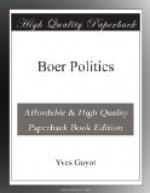“Why should he not appoint as one of his nominees an Uitlander of position, whose integrity and judgment he has confidence in? If none such exists, it would only be a proof of his want of tact and statesmanship in not rallying such people to his side.”
Mr. Melius de Villiers who was in Bloemfontein, while paying due attention to his brother’s warnings, wanted only to persuade Krueger to yield for the time being. Forwarding his brother’s letter he wrote to Mr. Fischer:
“Please impress
upon Oom Paul what I think is an important fact,
namely, that the present
Ministry in England will not always last.
“By giving way now, we do not do so in perpetuity; but I feel assured a Liberal Ministry will be willing to reconsider the relations of the South African Republic to England, and even to revoke the Convention of London.”
“Africa for the Afrikander, from the Zambezi to Simon’s Bay” remained the motto, only Mr. de Villiers looked to the future for its realization. Yet Mr. Krueger sticks to his policy of deceit taking back what had been already granted.
Mr. de Villiers is down upon the summary and arrogant way with which reasonable offers have been rejected, and alluded to the despatch of the 21st of August in which proposals made in the despatch of the 19th are declared to be subordinate to the abandonment of suzeranity rights and acceptance of the principle of arbitration for pending questions.
On the 28th of September Mr. de Villiers appeals to Mr. Fischer for the last time:—
“Supposing a war does take place, is there any chance of the Transvaal obtaining better terms when the war is over? The war will not cease until the Transvaal is entirely subjugated. What will the position of the Republics then be?
“The very best
friends of the Transvaal feel that the Bill
providing for the seven
years’ franchise is not a fair or workable
measure.
“I am assuming,
of course, that the proposals are such as can be
accepted without dishonour.
“I confess I look with horror on a war to be fought by Afrikanders to bolster up President Krueger’s regime. I could understand a war in defence of the South African Republic after it has made reasonable concessions to the demands of the new-comers, and after it has displayed the same desire to secure good government as is seen in the Orange Free State; but of such a desire I have not seen the faintest trace.”
He alludes again to the doings of Dr. Reitz and Smuts:—




